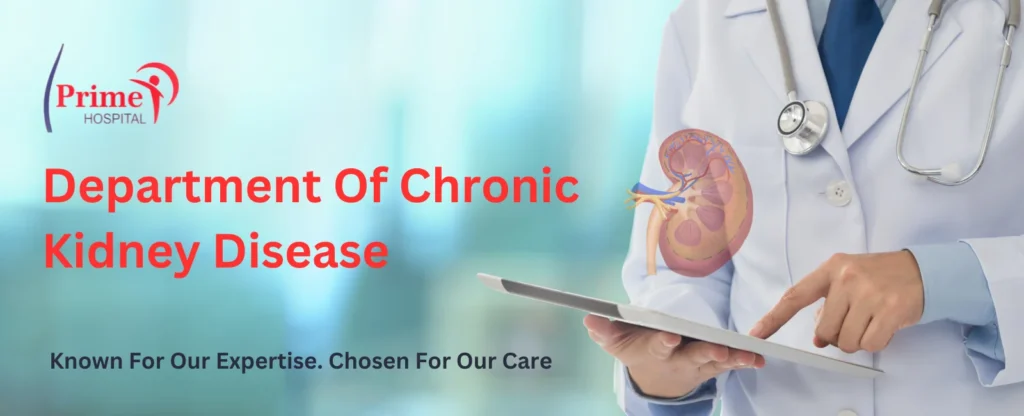

Best Chronic Kidney Disease Treatment In Panipat
Searching for the best Chronic Kidney Disease Treatment In Panipat? Prime Hospital’s The Chronic Kidney Disease Hospital in Panipat is where you should straight head to. Moreover, we have a team of specialized and highly experienced Doctors to offer the best treatment possible to patients suffering from different Kidney-related disorders.
What is chronic kidney disease (CKD)?
Renal failure or kidney failure are other names for chronic kidney disease (CKD). It indicates that the kidneys are injured and have lost some of their capacity to eliminate waste materials and extra water from the body. Waste products accumulate in the body as a result of this renal malfunction and are toxic to the body. Chronic kidney disease is also possible.
Along with, a kidney’s structural and functional problems that persist for longer than three months are referred to as chronic kidney disease. Chronic kidney disease (CKD) is a global health concern and a primary cause of death.
Best Chronic Kidney Disease Treatment In Panipat
What are the tests to identify kidney disease?
1. Complete urine examination
Additionally, the presence of blood or protein in the urine will be determined through testing. A microscopical examination of the urine will also be performed to search for any anomalies. Normally, there is relatively little protein in urine. In the proper clinical setting, any rise in urine protein will indicate the possibility of kidney disease. Red blood cells in the urine are another indicator that renal disease may be present, which needs to be confirmed by more testing.
2. Blood test
Similarly, the existence of renal disease is indicated by elevated levels of urea and creatinine, which will be examined in the blood. In the clinic, GFR is computed using creatinine measurements.
3. Ultrasound
A renal ultrasound examination will enable us to determine the location, quantity, size, and shape of the kidneys. Ultrasound examination is also used to check the bladder and ureters. For instance, Renal abnormalities, kidney obstructions, or undersized kidneys can all be detected by ultrasonography in patients with chronic renal disease.
Frequently Asked Questions
Acute kidney failure may be indicated by these symptoms, For Instance:
reduced urine production, albeit this could occasionally be normal.
swelling caused by fluid retention in the feet, ankles, or legs.
weariness, drowsiness, dyspnea, and nausea.
pressure or soreness in the chest.
It could cause convulsions or a coma in certain situations.
These signs could point to renal disease-related anemia:
You appear worn out and pale.
You’re not eating well and sleeping less.
Too tired to do your everyday tasks.
quicker heart rate.
You feel gloomy or out of breath.
Diabetic kidney disease may be indicated by these symptoms:
Itchy, dry skin.
Muscle spasms and puffiness surrounding the eyes.
having more frequent urination than usual.
Reduced weight.
These signs could point to glomerular disease:
Urine with blood in the stream will have a pink or cola tint.
renal failure or anemia.
face, hands, foot, and abdomen swelling.
urine with a high protein content that is foamy.
Hematuria may be indicated by these symptoms:
stomach ache.
low number of platelets.
tiredness, edema, and anemia.
